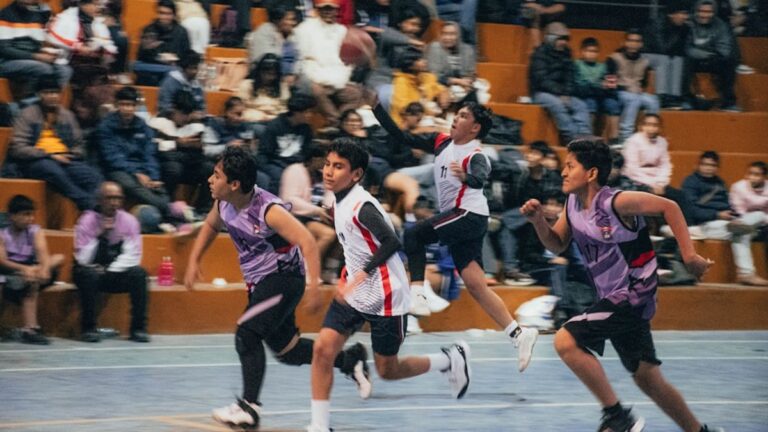Breaking Down Myths: What Performance Psychology Really Means for Athletes
In the world of sports, where the margins between victory and defeat are often razor-thin, the mental game is becoming more crucial than ever. Yet, when it comes to performance psychology, myths abound. You might hear phrases like “mind over matter” or “visualization is all you need,” but what do they really mean for athletes? Is performance psychology just a fancy term for positive thinking, or is there something deeper at play?
The Basics of Performance Psychology
At its core, performance psychology is the study of how psychological factors influence athletic performance. It encompasses a range of mental skills and techniques that athletes can use to enhance their performance, manage stress, and improve focus. Think of it as a toolkit for the mind, designed to help athletes perform at their best, especially under pressure.
But what’s often overlooked is that performance psychology isn’t just for elite athletes. It’s beneficial for anyone who participates in sports, from weekend warriors to high school competitors. (I remember my own days of competitive cheerleading—trust me, the nerves could get the best of even the most skilled performers!)
Myth #1: Performance Psychology is Just Positive Thinking
One of the most common misconceptions about performance psychology is that it’s solely about maintaining a positive attitude. Sure, positivity has its place, but it’s only a small piece of the puzzle. Athletes often need to confront their fears, doubts, and anxieties head-on to truly progress.
For instance, consider a basketball player who has a free throw percentage that’s dropping. Simply telling them to “think positive” isn’t going to solve the problem. Instead, a performance psychologist might employ techniques like cognitive restructuring, where the athlete learns to identify and challenge negative thoughts. They might also use imagery techniques to visualize successful free throws. This is where the real magic happens—through a blend of both mental training and practical skills.
The Role of Self-Talk
Self-talk is a key component of performance psychology. It’s not just about chanting “I am the best” like a mantra; it’s about developing a constructive inner dialogue. Research shows that athletes who practice positive self-talk can significantly enhance their performance. (I often chuckle at the irony of athletes whispering sweet nothings to themselves while standing in the spotlight.)
Myth #2: Visualization is a Magic Bullet
Visualization has been popularized as a magical tool for success. Picture this: an athlete closes their eyes, imagines themselves soaring through the air, and—bam!—they perform flawlessly. Sounds easy, right? The truth is, visualization requires practice and specific techniques to be effective.
Experts suggest that effective visualization involves not only seeing the successful performance in the mind’s eye but also engaging all senses. An athlete should feel the weight of the equipment, hear the crowd’s roar, and even smell the familiar scents of competition. Without this multisensory approach, visualization can feel more like daydreaming than a legitimate training strategy.
Real-World Applications of Visualization
Let’s take Usain Bolt as an example. The legendary sprinter often spoke about how he visualized his races before stepping onto the track. He didn’t just see himself winning; he imagined every detail—the starting gun, the sound of his feet hitting the track, the moment he crossed the finish line. This level of detail helps create a mental blueprint that athletes can draw upon when it matters most.
Myth #3: Mental Toughness is Innate
Ah, mental toughness—the holy grail of athletic performance. Many believe that some athletes are just born mentally tough, while others are bound to falter under pressure. This myth can be particularly damaging because it suggests that if you’re not naturally tough, you’ll never be able to succeed.
The reality is that mental toughness can be developed and nurtured. Techniques such as goal setting, positive self-talk, and coping strategies are crucial components of building mental resilience. (It’s like training for a marathon; you don’t just wake up one day and run 26.2 miles without months of preparation!)
Building Mental Toughness
For example, athletes can work on their mental toughness by facing challenges in practice—whether that means pushing through fatigue or overcoming mistakes. When they learn to manage their responses to adversity, they prepare themselves for the high-stakes situations that come during competition.
One renowned sports psychologist, Dr. Michael Gervais, often emphasizes the importance of seeing challenges as opportunities for growth. He states, “Mental toughness is about being able to endure discomfort and still perform at a high level.” This perspective shifts the focus from being born tough to becoming tough through consistent effort.
Myth #4: Performance Psychology is Only for Individual Sports
Another prevalent myth is that performance psychology only applies to individual sports. While it’s true that athletes in solo sports like tennis or golf often face unique mental challenges, team sports are no exception. In fact, the dynamics of teamwork can introduce a whole new set of psychological factors.
Consider a football team gearing up for the Super Bowl. The pressure is immense, and each player must not only focus on their individual performance but also coordinate with their teammates. Performance psychology can help teams develop cohesion, communication, and trust—elements that are just as crucial as physical skills. (I’ve seen my fair share of locker room pep talks that could rival motivational speeches in movies!)
The Importance of Team Dynamics
Effective communication strategies, conflict resolution, and shared goals can significantly enhance team performance. For instance, a study published in the Journal of Sports Sciences found that teams who engaged in team-building exercises showed improved performance on the field. In essence, performance psychology can foster an environment where athletes feel supported, valued, and motivated to give their all.
Myth #5: Only Elite Athletes Need Performance Psychology
Many people think that performance psychology is reserved for elite athletes—the ones making millions on professional teams. However, this couldn’t be further from the truth. Athletes at all levels can benefit from mental training. (I’m talking about the high school swimmer who’s aiming for a personal best or the weekend warrior trying to complete a triathlon.)
Psychological skills training can help athletes of any age or skill level manage pressure, set realistic goals, and maintain motivation. In fact, some studies suggest that youth athletes who receive mental skills training are more likely to stay engaged in their sport long-term. It’s not just about winning; it’s about fostering a love for the game.
Building a Foundation Early
By starting this mental training early, young athletes can develop a strong foundation that will serve them throughout their athletic careers—whether they go on to compete at the collegiate level or simply enjoy sports as a lifelong passion. (I wish I had access to these resources when I was growing up! Who knows, I might have become the next Olympic star… or at least a really enthusiastic amateur.)
Practical Techniques in Performance Psychology
So, how can athletes begin to incorporate performance psychology into their training? Here are a few practical techniques, grounded in research, that can make a world of difference:
- Goal Setting: Establish clear, achievable goals that can help provide direction and motivation. The SMART criteria (Specific, Measurable, Achievable, Relevant, Time-bound) can be particularly useful.
- Mindfulness Meditation: Practicing mindfulness can help athletes stay present and reduce anxiety. Techniques such as focused breathing or body scans can enhance concentration.
- Imagery Techniques: Regularly practice visualization to create a mental blueprint for performance. Make it vivid—engage all senses!
- Self-Reflection: Encourage athletes to keep a journal where they can reflect on their thoughts and emotions related to performance. This can enhance self-awareness.
- Positive Self-Talk: Develop a repertoire of positive affirmations and mantras to counteract negative thoughts during competition.
Each of these techniques takes time and persistence to master, but the benefits can be profound. Athletes who implement these strategies often see improvements not just in their performance, but in their overall enjoyment of the sport.
The Future of Performance Psychology in Sports
As the understanding of performance psychology continues to evolve, so too does its application in the world of sports. Coaches, trainers, and athletes are increasingly recognizing the importance of mental training as part of the overall athletic development process. This is a fantastic shift—because let’s face it, physical training alone just doesn’t cut it anymore.
Moreover, with advancements in technology, tools like biofeedback and performance tracking apps are becoming more prevalent, allowing athletes to monitor their mental states in real time. This data-driven approach can illuminate patterns in performance that may not be immediately obvious. (Imagine having a little therapist on your wrist, quietly nudging you toward better mental health during competition!)
Conclusion
In breaking down these myths surrounding performance psychology, it’s clear that the mental game is not just a supplement to physical training; it’s an essential component of athletic success. Whether you’re a budding athlete or a seasoned pro, understanding and applying the principles of performance psychology can lead to better outcomes, both on and off the field.
As we continue to break barriers in sports, the integration of mental training into athletic programs will undoubtedly become more sophisticated. Athletes who embrace this holistic approach will not only enhance their performance but also cultivate resilience and a deeper connection to their sport. In the end, it’s not just about winning; it’s about enjoying the journey and becoming the best version of oneself—mentally, physically, and emotionally.













